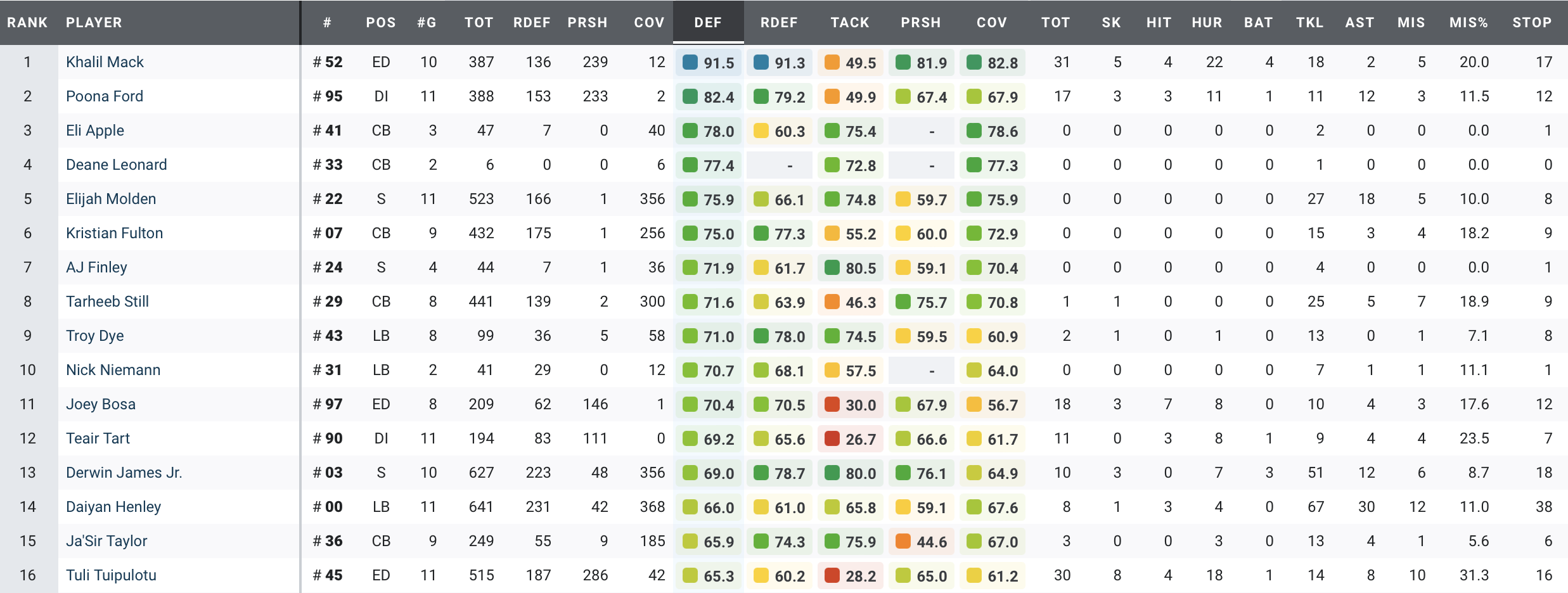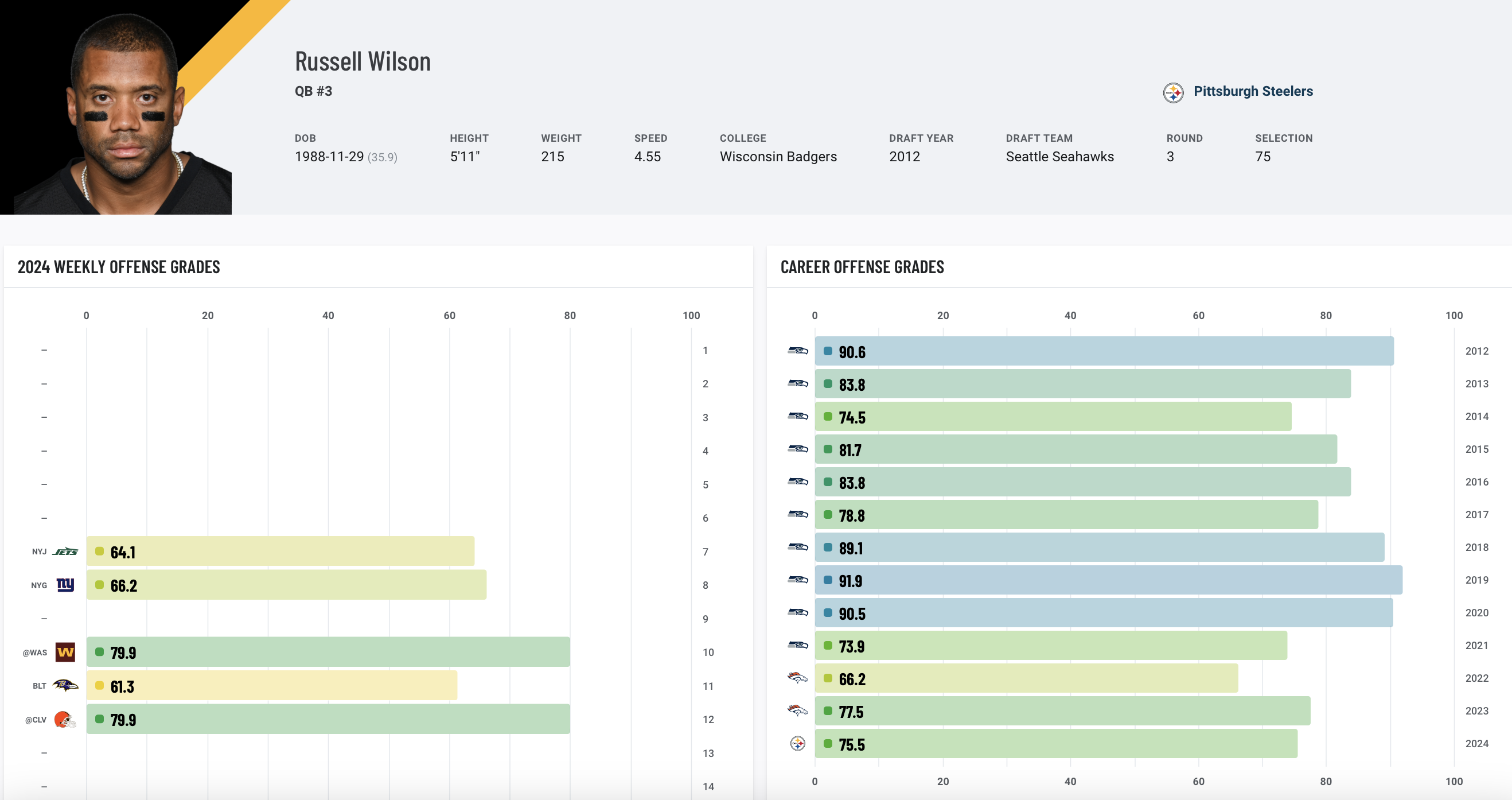• Will the Eagles improve their pass protection against the Ravens? Philadelphia's offensive line has been one of the worst in allowing pressure on a per-snap basis, but Baltimore hasn't ramped up the heat regularly either.
• Can the Commanders get their run game going against the Titans? Washington's rushing attack has slowed during its losing streak, and Tennessee has been stingy against runs.
• Unlock your edge with a PFF+ subscription: Get full access to all our in-season fantasy tools, including weekly rankings, WR/CB matchup charts, weekly projections, the Start-Sit Optimizer and more. Sign up now!
Estimated Reading Time: 9 minutes
While the outcome of every football game is influenced by the 22 players on each team’s side, examining the niche, micro-level battles adds an extra layer of nuance. That includes players or units battling head-to-head, or even defensive coaches trying to out-scheme the opposing quarterback.
Week 12’s focus on Josh Jacobs against the 49ers’ heavy boxes (75.1 PFF rushing grade, 32 yards after contact and three touchdowns) and Lamar Jackson against the Chargers’ zone coverage (77.8 PFF passing grade, 12-of-18 passing) played large roles in dictating which teams won. Now, let’s flip the script to Week 13.
Whether strength against strength, weakness against weakness or simply an individual war of great consequence, here are six matchups with a significant probability of determining winners this week.
Eagles’ pass protection vs. Ravens
The best game in Week 13 pits two contenders against one another. The Eagles and Ravens boast two of the NFL's best rushing attacks (and running backs), plus good front-four units, which makes this contest almost a reflection pool. What might be most fascinating is watching two strangely below-average units go head-to-head.
The Eagles’ interior offensive line — with Landon Dickerson, Cam Jurgens and Mekhi Becton — hasn’t missed much of a beat without future Hall of Famer Jason Kelce. The unit ranks sixth in PFF overall grade, but pass protection has been more of a struggle. Philadelphia's interior ranks only 15th in pass-blocking grade — and, by extension, the Eagles’ pass protection numbers have been shockingly bad. The Eagles are dead last in pressure rate and hurry percentage, not to mention 28th in sack rate.
On the other side of the ball, that trio will face off against a scary defensive line pair in Travis Jones and Nnamdi Madubuike. As a unit, the Ravens’ interior defenders rank eighth in PFF overall grade, but the bunch is only 17th in PFF pass-rushing grade. Although Jones and Madubuike have combined for 61 pressures, neither has recorded a pass-rush win rate higher than 11.3%. As a broader team, the Ravens haven’t been exceptional at generating pressure, slotting 21st in pressure and sack rates.
The catalyst for whoever wins this war in the trenches is Jalen Hurts’ play. The Eagles signal-caller has fared decently in avoiding sacks, being taken down on only 20.3% of pressures — which feels low relative to how much he’s been under duress. But Hurts has not fared well under pressure, as reflected by his 46.4 PFF overall grade — which ranks 31st out of 38 qualifying quarterbacks.
Will Jones, Madubuike and recently activated Michael Pierce break through the middle of Philadelphia's offensive line to throw Hurts off his spot? Or will Hurts have adequate time to sit in the pocket and potentially attack the Ravens’ weaker secondary? Whoever emerges victorious in that micro-war will probably get the edge in his high-stakes game.
Chargers‘ defensive line vs. Falcons‘ offensive line
Chargers-Falcons may not be in primetime, but it does offer an intriguing look at two current playoff teams looking to get back on track. Atlanta’s offense against Los Angeles' vaunted defense should involve some high-level maneuvering, especially along the line of scrimmage.
The Falcons boast the sixth-best offensive line in football by PFF overall grade. Perusing the team’s starters offers a glimpse into why: Only one (Ryan Neuzil) has posted a sub-60.0 PFF overall grade. Left tackle Jake Matthews (81.5 PFF pass-blocking grade) and right guard Chris Lindstrom (91.5 PFF overall grade) have played at the sky-high level we’re accustomed to.
But the Chargers' defensive line has quietly been disruptive all year. Los Angeles ranks seventh in PFF run-defense grade among its edge rushers and defensive linemen, plus 13th in pass-rush win rate. Khalil Mack (91.3 PFF run-defense grade, 31 pressures), Poona Ford (82.4 PFF overall grade) and Tuli Tuipulotu (30 pressures) headline the group, while Joey Bosa is still a force to be reckoned with, even in a down year. The Chargers also have depth in Teair Tart (69.2 PFF overall grade), Morgan Fox and Bud Dupree — the latter two of whom have crossed the 20-pressure threshold.
Will Atlanta hold up to give Kirk Cousins time to throw and clear lanes for Bijan Robinson in the run game? Or will the Chargers control the line of scrimmage, keep points off the board to help their shorthanded offense and correct their recent defensive issues? Whoever claims bragging rights in that department will probably win the game.

Kyler Murray holding onto the ball vs. Vikings
Cardinals-Vikings doesn’t offer quite as much promise as it would have if Arizona were still atop the NFC West, but this game still doubles as a potential playoff preview. And who doesn’t want to see Kyler Murray and the Cardinals' soaring offense take on one of the NFL’s stingiest defenses?
Murray's tendency this year has been to hold onto the ball to scramble — and be a playmaker. His 2.87-second average time to throw is the 16th slowest among qualified quarterbacks, although his splits on throwing under/over 2.5 seconds are relatively even. That aligns with Murray’s play style: His 81.5 PFF overall grade when holding the ball longer ranks ninth among qualifiers, compared to his 76.0 PFF overall grade when getting the ball out in 2.5 seconds or less, which ranks 17th.
Brian Flores’ defense has been rather effective in both situations, but probably more so against quick passes. Minnesota ranks second in defensive EPA per play when quarterbacks hold onto the ball for less than 2.5 seconds while allowing the third-lowest opposing passer rating (80.2). Those rankings jump to eighth and 13th, respectively, when quarterbacks can occupy 2.5 or more seconds.
The bottom line is that if Murray can extend plays, it favors the Cardinals' offense. But if Flores’ blitz packages can get home and keep Murray within the confines of the pocket, the scale should tip toward the Vikings.
Steelers‘ red-zone offense vs. Bengals
Another compelling game that might flow under the radar, Steelers-Bengals gives fans a glimpse at the AFC North leader — but a team clawing for its playoff lives. It feels as if both Pittsburgh and Cincinnati need a win in Week 13, and red-zone performance may drive that result.
Even in its dismal road showing at Cleveland last Thursday, Pittsburgh moved the ball into enemy territory fairly well. Issues arose in the red zone, though — a common refrain for much of this year. The Steelers rank 26th in red-zone EPA per play, converting only 44.7% of drives entering the opposing 20-yard line into touchdowns — the fourth-worst rate in football. Dovetailing with that is bad red-zone play from Russell Wilson, whose 53.8 PFF passing grade ranks 25th out of 35 qualified quarterbacks.
Meanwhile, the Bengals' defense hasn’t done well to limit opposing offenses deep in their territory. Cincinnati ranks 31st in red-zone EPA per play allowed, permitting touchdowns on a whopping 75% of red-zone possessions — the worst figure in the NFL.
Pittsburgh’s offense may be able to exploit a Bengals defense that’s disappointed all year, but will Wilson and company punch the ball in or will Cincinnati finally rectify a major issue and prevent red-zone touchdowns? In a game that feels like a toss-up, that small detail will prove significant.

Commanders‘ rushing attack vs. Titans
Few batted an eye at the Commanders playing the Cowboys at home in Week 12 — until the unfathomable occurred. After suffering arguably the worst loss by any team all year, Washington gets another crack at rectifying its three-game losing streak by taking on the 3-8 Titans. For as much as the Commanders should have the edge, they’ll need to be wary of a good run defense.
Washington’s rushing offense has served as one of its backbones all season. The Commanders rank fourth in rushing EPA per play, are tied for sixth in yards per play and rank 10th in success rate. Whether via quarterback Jayden Daniels’ scrambling or the backfield combination of Austin Ekeler and Brian Robinson Jr., Kliff Kingsbury’s run game has worked. However, those numbers have dwindled during the team’s recent slide, with Washington ranking only 14th in EPA per play and 20th in yards per carry.
On the other side of the ball lurks a Titans defense that’s been solid all year, especially against the run. Tennessee slots fourth in opposing rushing EPA per play, plus third in success rate and fourth in team run-defense grade. A big component of Tennessee’s massive road upset over the Texans was limiting Houston to only 17 carries for 40 yards, including averaging a lowly 1.24 yards after carry per attempt.
Will the Commanders produce like their early-season selves on offense, mainly on the ground? Or will Brian Callahan’s team remain disciplined against the run and force Daniels into obvious passing situations? If Washington wants to keep its dream season alive, it’ll need to realign its run game.
Jameis Winston when moved vs. Broncos
Monday night’s battle between the Browns and Broncos doesn’t appear as scintillating as some other games this week (maybe having six standalone games does that), but it’s still critical in the AFC playoff race. If Cleveland wants to upset another current top-seven seed in the AFC, it may be able to bank on Jameis Winston’s playmaking.
Over the past two weeks, Winston has recorded an NFL-best 91.8 PFF passing grade when he’s been moved in the pocket, going 8-of-11 for 199 passing yards, two big-time throws and zero turnover-worthy plays. Even as the Steelers forced Winston from the pocket in Week 12, he kept his eyes downfield and released several hold-your-breath throws with perfect accuracy en route to big gains.
Winston will face another of the NFL’s premier defenses in Denver, which has generally performed well when getting quarterbacks on the move. In those situations, the Broncos rank 10th in PFF defensive grade and boast the seventh-best PFF pass-rushing grade. At the same time, Denver holds the 16th-ranked coverage grade when quarterbacks get knocked off their spot.
If Winston remains undaunted and continues finding open receivers downfield, Cleveland could pull off another surprising (and chaotic) upset. But if Denver’s coverage remains sticky against old friend Jerry Jeudy, it should maintain its wild-card slot.



 © 2025 PFF - all rights reserved.
© 2025 PFF - all rights reserved.